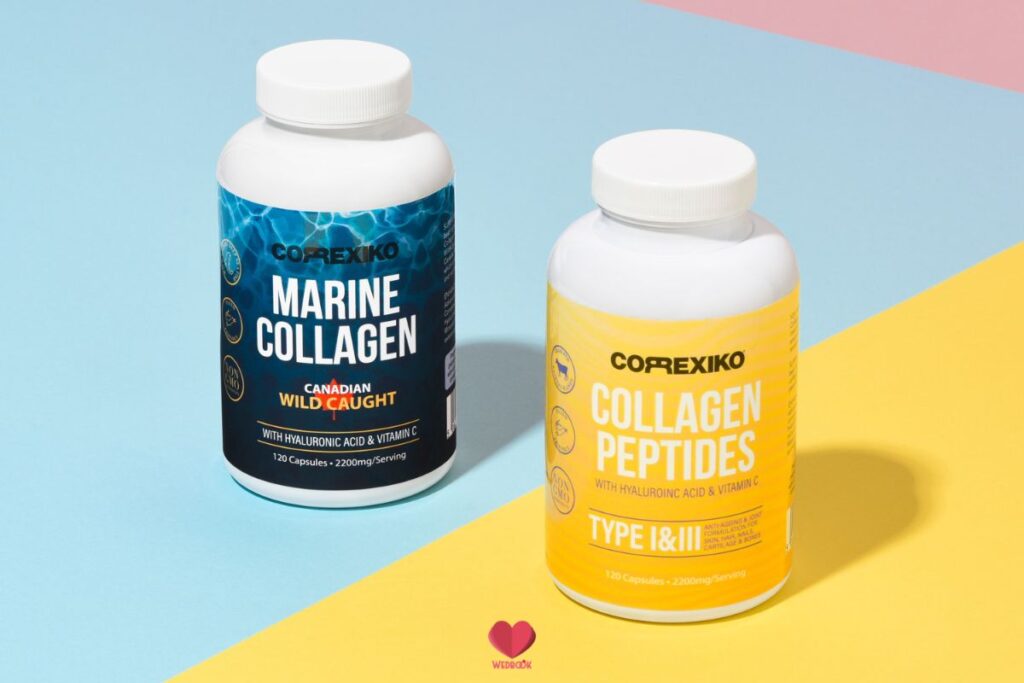Are there any benefits of taking collagen at night? Turns out, the night is the best time to take collagen.
Let’s dive deeper.
When it comes to health supplements, it’s not just the quality or the bioavailability of the supplements that matters, what also matters is when you take them. For example, probiotics are best taken at night as the stomach acid is least active at night and the good bacteria can reach the intestine, fat-soluble vitamins like Vitamin A, and D, are best absorbed when taken with food rich in good fats, and water-soluble vitamins like Vitamin C are best taken on an empty stomach.
What about collagen though? When’s the best time to take collagen supplements?
Night.
The night is the best time to take collagen and there are many benefits of taking collagen at night. But we will delve into the second part later. First, let us explain why night is the best time for your collagen supplement and other benefits of taking collagen at night.
What Are The Benefits Of Taking Collagen At Night?
One of the benefits of taking collagen at night is that your body is naturally recovering when you sleep and by syncing up your supplements with the body’s natural collagen production time, you enhance the effects of your supplement. It’s the same reason why some people think taking protein powder works better at night too. Your muscles recover the most during the night and by feeding them protein supplements at the same time, you are able to get more benefits from them. If you’re someone who takes their protein powder at night, you can mix the collagen with your protein shake for a soothing and nutritious night-time drink.
One of the other benefits of taking collagen at night is collagen is loaded with an amino acid called glycine, an inhibitory neurotransmitter that calms the nervous system so you feel relaxed and rested, which helps in falling asleep faster. Glycine has been proven to induce sleep in subjects by triggering a drop in body temperature, supporting more REM sleep, and helping them doze off quickly. Besides, glycine also helps in the secretion of serotonin, a feel-good hormone responsible for our body’s production of melatonin, which signals our body when it’s time to sleep and promotes feelings of sleepiness. Furthermore, a 2007 study also concluded glycine supplementation helped improve sleep quality and people who took it felt more energetic in the morning.
Since collagen is primarily made of glycine, one of the major benefits of taking collagen at night can be better sleep.
Other Benefits Of Taking Collagen:

If you’re looking for the benefits of taking collagen at night, these two might be it. But there are other benefits of taking collagen too which can be reaped no matter when you take the supplement.
#1 Improves Skin Health
Collagen makes up 30% of the total protein content in all animal skin and bones, and it’s the most abundant form of a structural protein in the skin and bones. Naturally, it plays a key role in the skin’s health and appearance by keeping it firm, elastic, and supple. However, the collagen stores in your skin start depleting anytime around your late 30s. Though this is a natural process, it can be accelerated by many factors like diet, photoaging, stress, environmental factors, etc. There are ways to keep your body’s collagen store intact though and keep collagen production up to speed, like taking collagen supplements.
There’s growing evidence that consuming collagen supplements can help with your skin’s elasticity, improve wrinkles’ appearance, and help with moisturization. A 2019 study done on 72 healthy women aged 35 years or older received a blend of 2.5 grams of collagen peptides along with other ingredients like acerola fruit extract, Vitamin C, zinc, biotin, and a native Vitamin E complex. At the end of 12 weeks, all women reported significant improvements in their skin hydration, elasticity, roughness, and density. Another research measured different aspects of skin health after 12 weeks of intake of marine collagen in women. The results showed overall improvements in skin score, wrinkles, elasticity, hydration, radiance, and firmness. Collagen works best for your skin health when ingested rather than applied topically, so it’s best to rely on supplements to experience its benefits.
#2 Promotes Gut Health
Besides skin health, collagen also plays a role in improving our gut health. It does so by rebuilding and strengthening the lining of our digestive tract made of epithelial cells. These cells sit shoulder-to-shoulder in our gut and play an important role in passing digestive food and fluid into our circulation. When a wider gap is created due to some reason, this can cause inflammation and immune function dysregulation in the body. Collagen however contains amino acids that play an important role in developing and strengthening this gut lining. It’s proven to ameliorate intestinal epithelial barrier dysfunction by enhancing tight junctions.
In another study, 20 grams of collagen peptides showed improvement in bloating and other mild digestive issues after 8 weeks and without any other lifestyle or dietary interventions. Research has also shown that IBD patients have decreased levels of collagen in their bodies. The evidence to support the strong link between collagen and gut health is growing, and it may be of benefit to up your collagen production for gut health either through supplementation or through dietary changes.
#3 Helps In Boosting Your Mood
Collagen can also have a positive impact on your mood. One of the primary amino acids in collagen is glycine, a known supplement to help you feel relaxed and happy. Glycine helps in increasing the levels of serotonin in the body without affecting the levels of dopamine. Serotonin is commonly known as the “feel-good” hormone and helps in regulating our mood. Low levels of serotonin in the body are often associated with feelings of depression and anxiety. Besides boosting serotonin levels, glycine is also known to help you sleep better by lowering your core body temperature, promoting feelings of relaxation, and enhancing the REM sleep cycle. This is also one of the main benefits of taking collagen at night as it can help elevate the quality of your night sleep. A good shut-eye further keeps your mood stabilized.
Collagen supplements also make your physical appearance better, which has been linked to mental health issues like eating disorders, mood disorders, and anxiety disorders. Collagen helps in the improvement of your skin and hair health, which consequently gives a major boost to your mental health as well.
#4 Long-Term Health Benefits
Besides these mainstream benefits, collagen has many other health benefits like controlling your blood sugar, sharpening your brain, improving memory, and reducing joint pain. Improving joint health is actually one of the primary reasons why people supplement with collagen. Collagen is an important component of the connective tissues in the body, including joints, bones, and cartilage. It provides structural support and helps to maintain the elasticity and strength of these tissues. Studies have shown that collagen supplementation may help to improve joint health by reducing pain and inflammation associated with conditions such as osteoarthritis. Overall, taking collagen supplements can help you in a number of ways besides skin health and appearance.
What’s The Most Bioavailable Form Of Collagen?
Before we dive into the most bioavailable form of collagen, let’s define bioavailability. Bioavailability is a term used to describe the extent to which a substance is absorbed and made available to the body to have an active effect. It refers to the fraction of an administered dose of a substance that reaches systemic circulation and is available for use by the body. Bioavailability can be influenced by various factors such as the form in which the substance is taken, the route of administration, and the presence of other substances that can interact with or affect the absorption of the substance.
In the case of dietary supplements, the bioavailability of the active ingredients can be improved by formulating the product in a way that enhances absorption, such as by using a form that is easily absorbed by the body. In the case of collagen, hydrolyzed collagen is the form you should look for in the supplement as that’s the formulation that’s best absorbed by the body.
Hydrolyzed collagen, also known as collagen peptides, is formed when full-length collagen goes through hydrolysis. The resulting product has short-chain amino acids, which makes it easier for the body to absorb. The larger molecules can also cause gut irritation, making hydrolyzed collagen a good alternative for those who have digestive issues and gut sensitivity.
What Breaks Down Collagen In The Body?

#1 Stress
Stress triggers collagen loss as the increased level of the stress hormone cortisol is proven to degrade collagen by attacking the existing molecules and preventing the formation of new collagen molecules in skin cells. Stress also triggers the fight-or-flight response, which diverts more circulation to your heart, brain, and lungs, and reduces the blood circulation in your skin. Collagen is formed in skin cells through a variety of vitamins, minerals, and nutrients that are delivered by blood. When blood flow reduces, fibroblasts (skin cells responsible to make collagen) cannot produce collagen as effectively – resulting in less firm and brighter-looking skin.
There’s another way stress harms your collagen. Stress increases the level of inflammatory molecules, which reduces your body’s ability to create new collagen. It’s safe to say, managing stress is important to support your collagen production. You can include many stress-management techniques in your lifestyle like meditation, deep breathing, journaling, and yoga. You should also focus on reducing stress hormones in the body by maintaining a healthy diet and indulging in regular exercise. Therapy is also a great idea when you aren’t able to manage the stress on your own and need some form of professional help.
#2 Sugar
Sugar is good for practically nothing, including your collagen fibers. Eating sugar ages the skin and hence the term “sugar sag” was coined in a skin therapy journal, detailing the hypothesis on how glucose and fructose link with collagen proteins in the skin to form Advanced Glycation End Products (AGEs), making them difficult to repair. AGEs are a heterogeneous group of molecules that are a normal part of human metabolism, but the production of which increases when blood glucose levels are high, when there’s oxidative stress (which is also caused by sugar among other factors), and due to exposure to UV rays.
Excess sugar consumption breaks down collagen and elastin fibers and sugar is also linked to a variety of other skin problems like persistent acne and frequent breakouts. To keep your collagen and elastin safe, you should consider cutting out white sugar from your diet. Many alternatives like stevia and xylitol should also be consumed in lesser amounts. Instead, opt for naturally-occurring sugar substitutes like honey, maple syrup, dates, and fruit purees to add some sweetness to your food without causing any damage to your skin.
#3 Refined Carbohydrates
Refined carbohydrates like white flour, white sugar, pasta, pastries, and many breakfast cereals, can harm collagen in your body in majorly three ways. First, consuming high amounts of refined carbohydrates can increase insulin levels, which can trigger a process called glycation. Glycation is a reaction between glucose and proteins in the body, which can damage collagen fibers and reduce their stability. Additionally, consuming large amounts of refined carbohydrates can also contribute to oxidative stress and inflammation, which can further damage skin cells and reduce collagen production. Lastly, refined carbohydrates quickly become sugar in your body. Sugar adheres to the collagen fibers and destroys them. This happens even faster when your sugar levels are already high or you love regular sweet treats in your diet.
Now, don’t be sad. You can still have your occasional cheat meal with your favorite cheeseburger and decadent pastry, but limit them to around once a week or so. You also need to check for refined carbohydrates in your diet. Is the breakfast cereal you’re eating highly processed? Because that’s masked refined carbs you’re consuming EVERY DAY. Similarly, is the pasta you’re making made of refined flour or whole grains? Check the label. Try to include more whole grains in your diet and if you’re someone who is busy, consult a registered dietician for a meal plan that serves your requirements without taking much of your time.
#4 Tobacco Smoke
If you want to amp up your body’s production of collagen and also protect your existing collagen fibers, the best thing to do is quit smoking. Tobacco smoke causes oxidative stress in the body which not only reduces the production of collagen in the body by damaging skin cells but can also cause the collagen present in your body to deteriorate. Over time, this damage can result in wrinkles, fine lines, and sagging skin. Besides smoking cigarettes, you should also be mindful of consuming alcohol as excess alcohol consumption also causes oxidative stress and inflammation taking a toll on your existing collagen.
To reduce the negative effects of tobacco smoke on collagen production and skin health, it’s best to avoid smoking and exposure to secondhand smoke as well. It’s said that secondhand smoke is as dangerous as first-hand smoke and some studies suggest that secondhand smoke is actually worse than firsthand smoke. So, next time your friends go out for a smoke, it’s best to not accompany them. Quitting smoking can be challenging but it can have a range of health benefits like improved skin health, lower risk of cancer, and healthier lungs.
#5 UV Radiation
When it comes to aging and wrinkles, there’s nothing that does more damage than excess UV radiation. While staying in the morning Sun for 15 minutes or so is essential for your body’s happy hormone levels and Vitamin D production, excess Sun exposure can actually do much more harm than good. You see, the Sun rays are made of two different rays (characterized based on their wavelength): UVA and UVB. UVA rays have a longer wavelength and are able to penetrate the dermis layer of the skin, where collagen, elastin, and other fibers exist. When the UVB rays reach the dermis, they damage the collagen fibers and can cause a variety of other skin conditions like brown spots or dull-looking skin.
To reduce the negative effects of UV radiation on collagen production, it’s important to protect the skin from sun exposure by seeking shade, wearing protective clothing, and using a broad-spectrum sunscreen with a high SPF. It’s also a good idea to limit sun exposure, especially during peak hours, and to avoid tanning beds, which can also emit UV radiation. You will also want to incorporate skin-care products containing ingredients like Vitamin C, Vitamin E, and other antioxidants which amp up the protection of the skin against UV rays further.
Here are some good broad-spectrum sunscreens to try: Option 1 || Option 2 || Option 3 || Option 4
How To Support Collagen Production Naturally?
![]()
![]()
![]()
![]()
![]()
![]()
![]()
![]()
![]()
![]()
![]()
![]()
![]()
![]()
![]()
![]()
![]()
![]()
![]()
![]()
![]()
![]()
![]()
![]()
![]()


#1 Take Your Beauty Sleep Seriously
Adequate sleep is important for overall health and wellness, and it may also play a role in supporting collagen production. During sleep, the body repairs and regenerates cells, including those responsible for producing collagen. While the skin cells are regenerating throughout the day, they regenerate quickly during the night, and collagen is produced during this process. This means the more and better you sleep, the more collagen you will wake up with the other day. There is also increased blood flow during sleep, which further helps with collagen production and repair. On another note, an increase in blood flow helps with both collagen and elastin production, so now you have another reason for getting a good, relaxing massage.
A good shut-eye also decreases levels of cortisol in the body. Cortisol at higher levels can decrease collagen synthesis and even tear down existing collagen proteins. A good 7 to 9 hours of sleep will however lower cortisol hormone so the collagen synthesis happens in your body smoothly. Besides collagen, your body also produces elastin during the night. While collagen’s main responsibility is to make skin cells strong and resilient, elastin gives them flexibility, together they work to give your skin a firmer, smoother, and suppler appearance.
#2 Eat A Well-Balanced Diet
Since we all know beauty comes from within, your dietary habits can play a major role in collagen production in your body. You should focus on whole, nutritious foods, rich in a variety of minerals and vitamins. Protein-rich foods are important because collagen is produced when your body combines amino acids – nutrients you receive when you eat foods rich in protein. The main amino acids that make collagen are glycine, proline, and hydroxyproline. You can find them in abundance in foods like legumes, soy, fish, eggs, and dairy.
Besides proteins, collagen is made majorly from 5 other vitamins and minerals – Vitamin C (found in citrus fruits, bell peppers, broccoli, and Brussels sprouts), Vitamin A (leafy greens, sweet potato, liver, cheese, clams, carrots, and mangoes), zinc (beans, nuts, crabs, lobster, and whole grains), copper (organ meats, fish, nuts, seeds, and chocolate), and magnesium (whole wheat, spinach, cashews, dark chocolate, quinoa, and black beans).
Yet another dietary habit to focus on is to eat foods rich in antioxidants. Just eat a variety of whole fruits and vegetables in different colors. That alone will ensure you’re having enough antioxidants in your diet. What antioxidants do is reduce oxidative stress in the body. So they hamper the very process which destroys collagen in the body. Antioxidants preserve the existing collagen in the body and have a host of other benefits for your skin like reducing cell damage, boosting cell repair, and protecting the skin from environmental stressors.
#3 Do High-Intensity Exercises
All forms of exercise can boost collagen production. There’s a simple reason behind it – exercise helps to supply fresh oxygen and vitamins throughout the body and to your skin cells so they can repair and multiply. This helps nourish the fibroblasts – the type of cells responsible for secreting collagen protein. Further, there are certain kinds of exercises that further help in the stimulation of collagen, like HIIT, resistance training, and lifting weights.
Studies have shown that exercises like HIIT, resistance training, and lifting weights release a growth hormone in your pituitary gland that stimulates the production of collagen. You don’t have to go to the gym to take advantage of these collagen-boosting exercises. There are actually some that you can try at home like squats, pushups, walking lunges, jumping jacks, and crunches. You can consult any certified trainer for more exercises that uses your own body weight as they double up as resistance exercises.
Additionally, exercise reduces stress by reducing hormones like cortisol and adrenaline in the body. The results were more pronounced in medium-intensity and high-intensity exercises than that in low-intensity exercises like brisk walking. Stress hormones cause existing collagen fibers to break down. Exercising protects your existing collagen fibers and also supports the development of new ones.
#4 Take Collagen Supplements
Collagen supplements can also boost the production of collagen in your body. Though, try to find the one that’s hydrolyzed. Hydrolyzed collagen is a form of collagen that has been broken down into smaller peptides, making it easier for the body to absorb. The smaller size of the peptides in hydrolyzed collagen allows them to be absorbed more easily by the body, where they can be used to support the production of new collagen fibers. It’s important to take collagen or any other supplements in a form so they are absorbed by your body. When the supplements aren’t bio-available (bioavailability is the ability of a drug to be absorbed or used by the body), they won’t show any visible effects and will be excreted out of your body. Hydrolyzed collagen is available in various forms, including powders, pills, and liquids.
Many randomized controlled studies have proven collagen supplements’ positive effects on skin and joint health. In a 2018 study, collagen peptides were given to 120 subjects and after 90 days, the subjects showed visible improvements in skin elasticity, joint health, and joint mobility. Another controlled study showed collagen peptides improved skin hydration and elasticity after twelve weeks.
P.S.: Collagen supplements do work, but they work best when they’re supported by natural ways to boost collagen as well, like diet and exercise. Use them as a support strategy to amp up collagen and not as an alternative.
#5 Consume Aloe Vera Gel
You will be surprised to know how much aloe vera gel can help with collagen production in the body. We were surprised when we were doing our research too! And it’s not just gimmicky, there’s actual research proving aloe vera gel’s magical benefits on increased collagen content in the body. A 2009 study proved aloe vera supplementation for 90 days improved facial wrinkles, skin elasticity, and type I procollagen gene expression in healthy female subjects. Another research concluded aloe sterol ingestion over a period of 12 weeks stimulated collagen and hyaluronic acid production in human dermal fibroblasts.
Now that you’re convinced of consuming aloe vera gel for its collagen ramping-up benefits, we should tell you that aloe vera gel is best consumed raw from the plant rather than the juice in the containers sold in the stores. Aloe contains aloin, a bitter, yellow substance that shouldn’t be consumed. It can be easily taken out though, by soaking the leaf and gel for a while in the water. Commercially produced aloe vera juices generally don’t follow this process of taking out aloin and can also contain harmful preservatives. Aloe vera plant can easily be grown at home and you can mix the gel in your smoothies and juices easily. Below, find a video that explains a safe way to consume aloe vera gel at home!
FAQ’s


Can Taking Collagen At Night Make You Sleep Better?
One of the unexpected benefits of taking collagen at night is that it can help promote quality shut-eye. Collagen contains an amino acid called glycine, an inhibitory neurotransmitter that relaxes your nervous system, improves serotonin levels, and stabilizes sleep rhythms for better quality sleep. The benefits of glycine on the sleep cycle have been proven by research as well. One study showed how glycine helped subjects reach slow-wave sleep more quickly, and another demonstrated how oral supplementation triggered a drop in body temperature (key to helping the body’s natural progression towards sleep) and promoted more REM sleep. The amount of glycine you need for these effects is probably present in your collagen, and if quality sleep is an issue, you should further consider drinking collagen at night.
Can I Drink Collagen At Night?
Yes, there are many benefits of taking collagen at night. If you take it in the form of a pill, you can just consume it directly with water, but if you take it in the powder form, you can choose to mix it in water or a nighttime smoothie or protein shake. Some people believe that taking protein shakes at night also has many benefits like giving your body enough amino acids to promote repair and muscle mass growth during sleep. So, if you have your protein shake at night, it’s fairly easy to remember to take a scoop of your collagen supplement as well. Although, if you don’t have your protein shake at night, then another alternative to having collagen powder is having a good bedtime smoothie before bed that contains ingredients that promote sleep like almond milk, spinach, banana, and oats.
Collagen Powder Vs Pills: Which Is Better For You?
It doesn’t matter how you take your collagen – either pills or powder or even liquid, all that you should see when picking a collagen supplement is that it should be bioavailable and should be absorbed by the body. Marine collagen is considered to be 1.5 times more bioavailable than other types of collagen. But if you’re looking for some other types of collagen to include, look for the term hydrolyzed collagen.
Hydrolyzed collagen, also known as collagen peptide or collagen hydrolysate in the market, is a form of collagen that has undergone a process of hydrolysis, which breaks down the larger collagen molecules into smaller peptides. This process makes the collagen easier for the body to absorb and utilize, as the smaller peptides can be more easily absorbed into the bloodstream. You also need to consider what type of collagen you want to consume. Marine collagen is primarily type I (which is the most abundant type and supports skin, bone, and tendons), while bovine collagen contains a mix of type I and type III (often used for wound healing and tissue repair).
Once you have decided what kind of collagen you want to supplement with along with other vitamins & minerals it comes with (for example some collagen supplements come with hyaluronic acid as well), it’s upto you to decide whether you want to take it in pill form or powder form. Some people find the pill form convenient as they can take it on the go. Others like powder form so they can mix it in their coffee and smoothies. Ultimately, both forms of collagen supplementation can be effective, and the choice between powder and pills depends on your individual preferences and needs.
Best Collagen Supplements To Try:
-
Vital Proteins Collagen Peptides: $24.75 for 13 servings (Buy Here)
-
Amandean Wild-Caught Fish Marine Collagen: $45.95 for 50 servings (Buy Here)
-
ForestLeaf Collagen With Hyaluronic Acid & Vitamin C: $22.95 for 120 capsules (Buy Here)
-
Ora Plant-Based Collagen Boosting Powder: $29.12 for 20 servings (Buy Here)
-
Codeage Hydrolyzed Multi Collagen: $33.99 for 90 counts (Buy Here)





